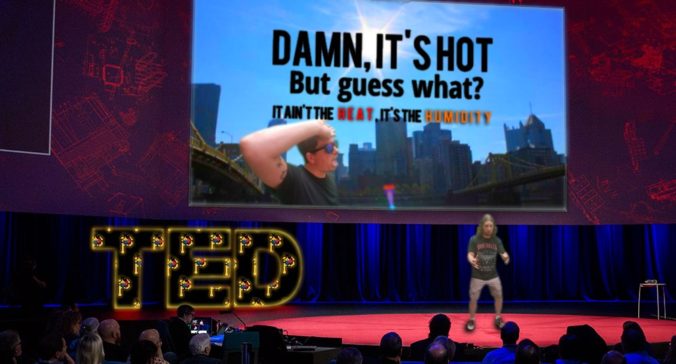NEW YORK — Baldwin resident Rick Balaski hosted a TED Talk yesterday, in which he contended that the stretches of intense warmth affecting places like Pittsburgh are more the result of humidity levels than “the heat all by itself.”
“Listen, I ain’t going to bore you to death with details,” Balaski noted during the early stages of his 139-minute presentation. “I’m just going to tell it to yinz straight: heat don’t [sic] got nothing to do with what’s making us all warm. It’s the humidity.”
The 41-year-old allegedly relied heavily on anecdotal evidence and reasoning that some members of the audience found unconvincing.
“He talked a bunch about how it rained a lot in Pittsburgh,” said attendee Maria Geyer. “Then every 20 minutes or so he would show some slide equating rain to water and water to humidity before putting his hands up like we were supposed to fill in the rest ourselves.”
Added Geyer: “This, of course, was between extremely long-winded sports hot takes and several attempts to ‘pump up the crowd’ by having us chant ‘hu-mid’ over and over again.”
Despite reportedly having no empirical data, references to scientific research, or professional credentials in a related field, Balaski argued that he was perfectly qualified to address the topic of extreme weather patterns.
“Sure, I ain’t no Joe DeNardo,” he said in an interview late last night. “But, honestly, these meteorologists are wrong half the time anyway. Guy on Channel 4 told me it was going to rain at 6 [p.m.] a couple days ago. Ended up raining at 7. That’s an hour I could’ve been drinking on the deck or mowing the lawn — hell, or both.”
He continued to suggest that personal experience was a more valuable tool than evidence-based material.
“I might not have some fancy graphs or certificate with my name on it, but I do have a degree in common sense.”
Balaski stated that, criticism aside, he has begun considering topics for future presentations, including the dangers of crossing rivers and the adverse impact of bike lanes on roads that he never uses.

